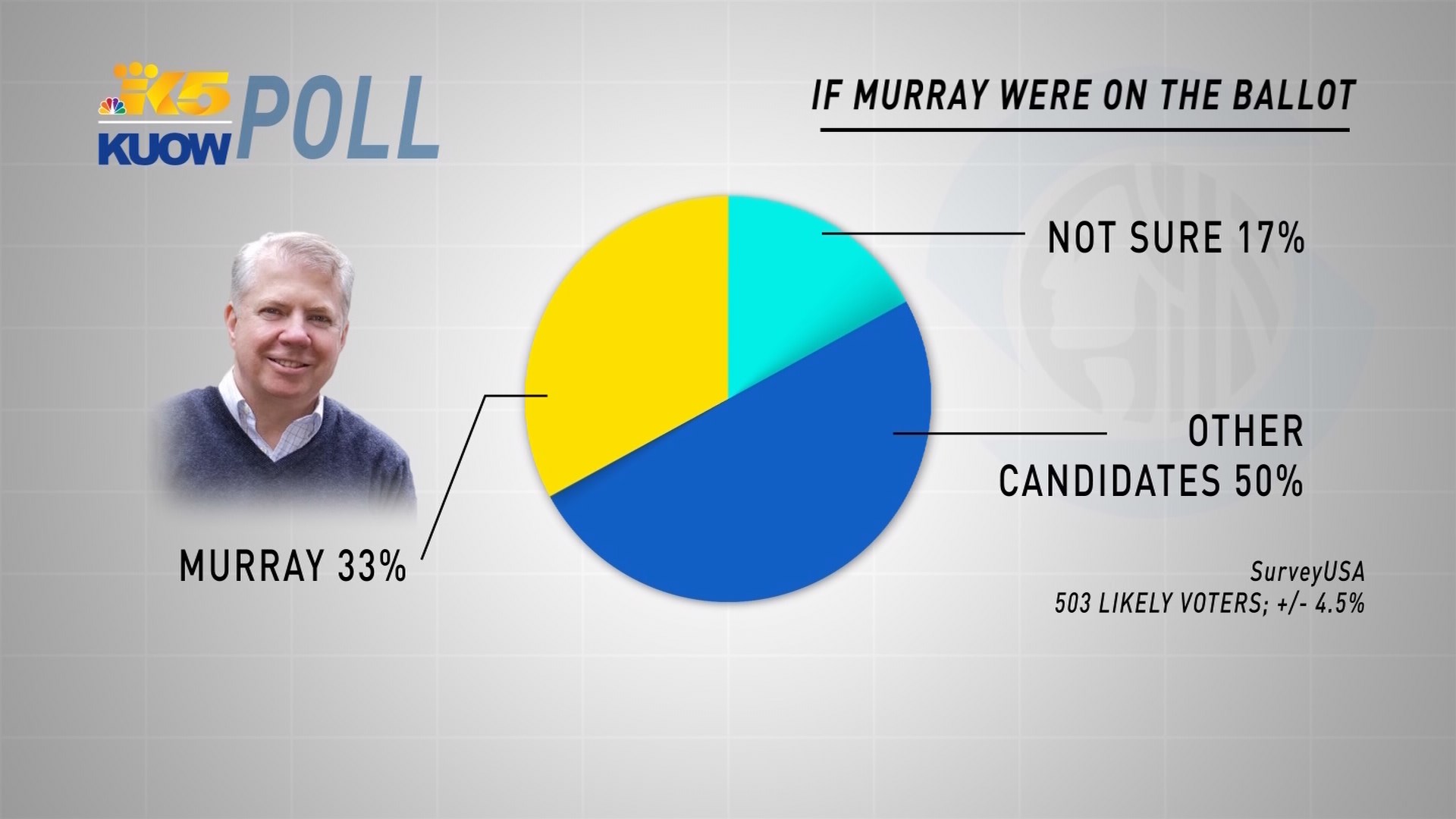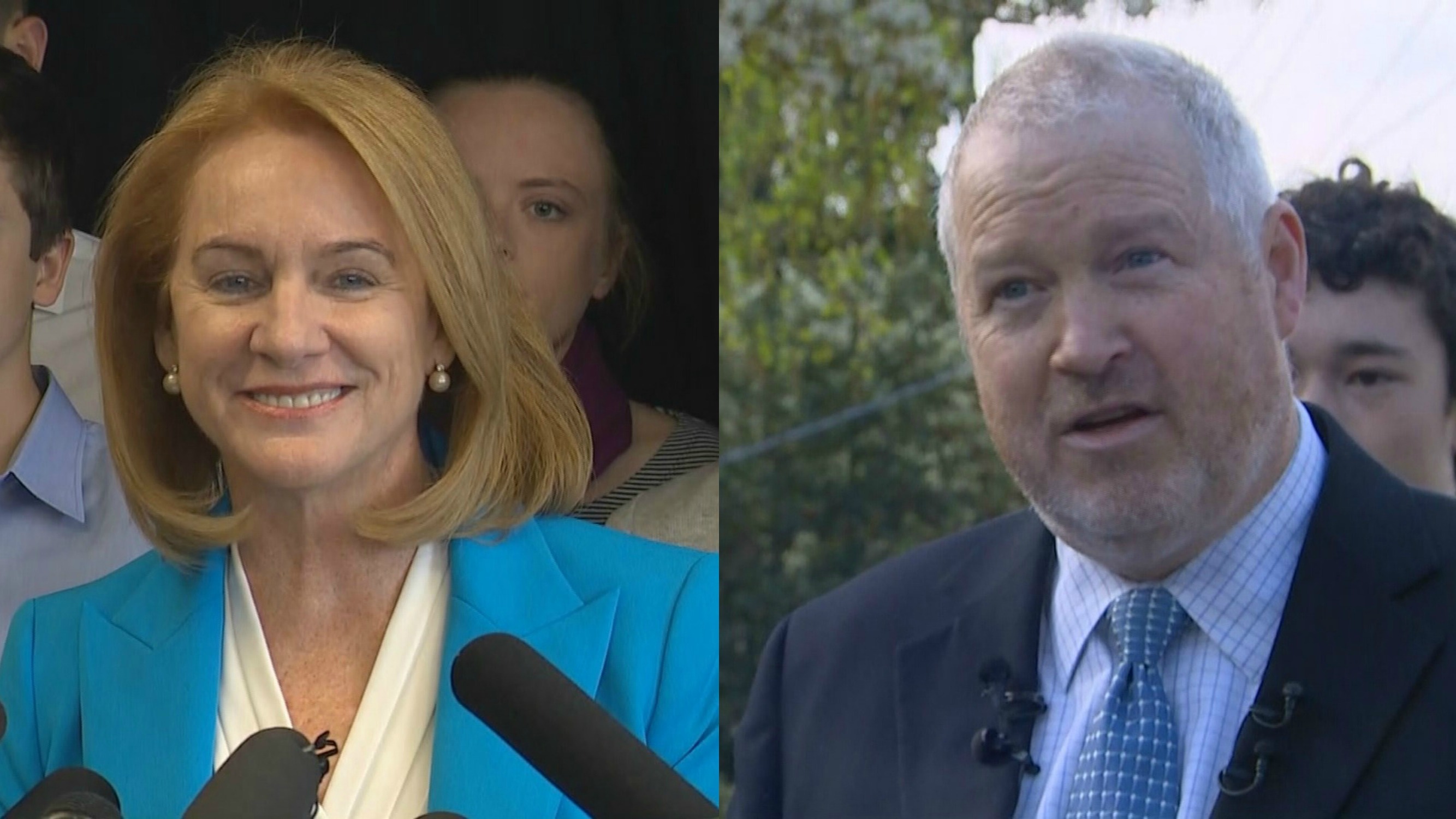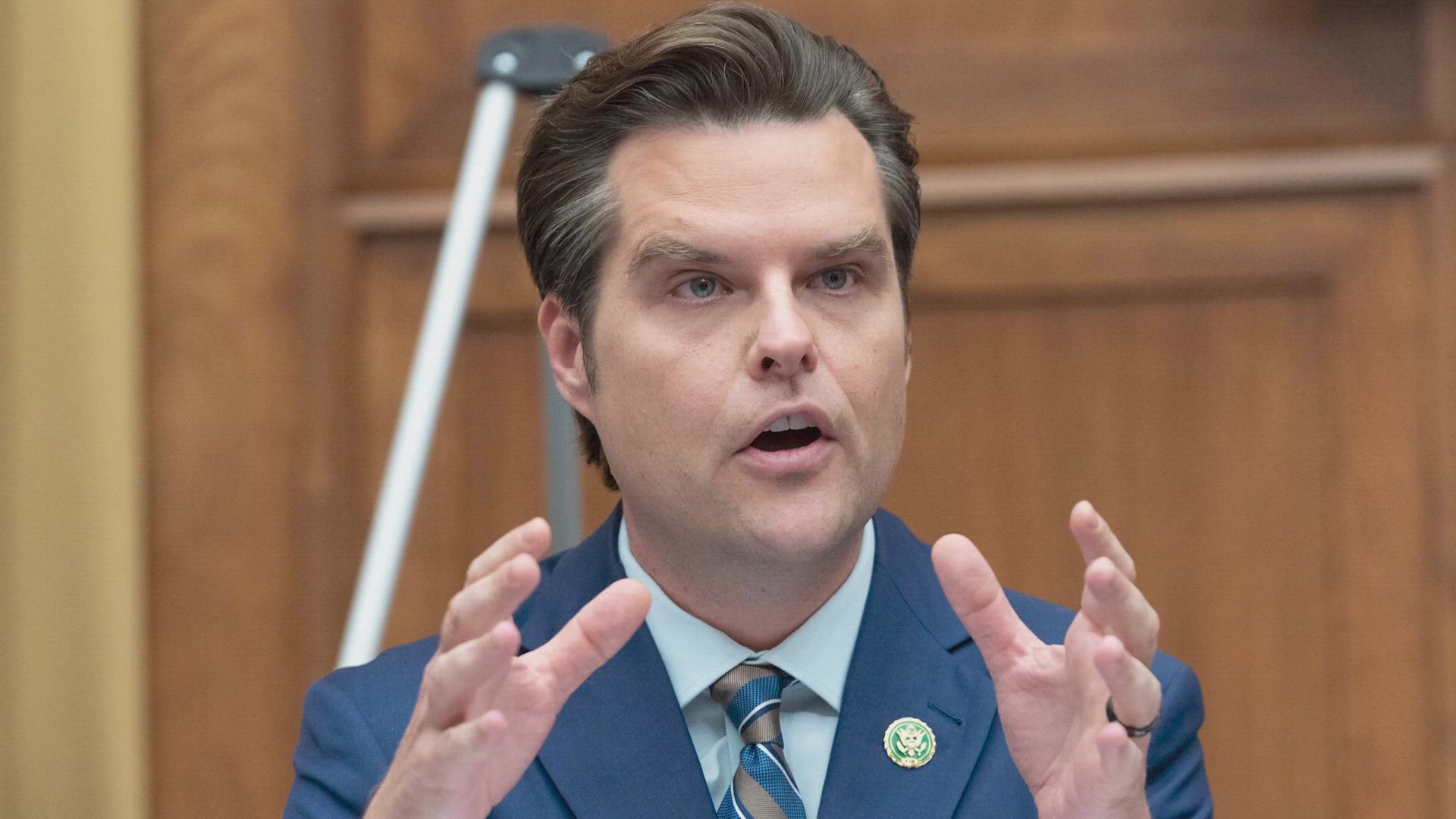If viewing in the app, click here
Former Seattle Mayor Mike McGinn and former U.S. Attorney Jenny Durkan emerge as the frontrunners in a wide-open mayoral primary, according to an exclusive KING 5/KUOW poll conducted by SurveyUSA.
However, a sizable chunk of undecided voters, nearly 40 percent, makes the 21-candidate race far from a foregone conclusion, according to pollster Jay Leve.
McGinn led the pack with 19 percent of likely voters surveyed, suggesting name ID factored into the poll. Durkan trailed in second but appears neck and neck with McGinn when you factor in the margin of error.
Attorney, organizer and artist Nikkita Oliver took the third spot, with a narrow lead over previously elected candidates State Senator Bob Hasegawa, who took 8 percent of the vote, and former State Representative Jessyn Farrell, who took 6 percent. Urban planner Cary Moon rounded out the top six with 3 percent.


With nearly 4 in 10 voters undecided ahead of the August 1 primary, pollsters consider the contest “wide open” and say the battle lines are not yet clearly drawn.This poll, in part, has helped identify which candidates will participate in a Seattle mayoral debate hosted by KING 5, KUOW, Geekwire, and Seattle CityClub to be held on July 17.Should Mayor Murray have continued his bid for re-election?About half of the voters polled believe Mayor Ed Murray made the right decision in dropping out of the race after a civil suit was filed alleging sexual abuse in the 1980s.

However, a third of voters surveyed wanted him to run for re-election and said they would have voted for him if his name appeared on the ballot.

The mayor has denied the allegations against him, and last week the civil suit against him was dropped. His accuser says he will wait to pursue the case when Murray is out of office.However, Murray has not ruled out a write-in campaign. A personal spokesperson for the mayor told KING 5 on Wednesday that Murray is fielding his own poll this week and "will likely make a decision about the race next week."
Frontrunners' support
Former Mayor Mike McGinn leads with male voters and younger voters, 2:1 in the KING 5/KUOW poll. He also does well with minority voters, particularly Hispanic voters.
Back in 2013, when then-Mayor McGinn was running for re-election, he received strong support from minority groups. A past article says “Hispanic and East African leaders praised him for reaching out to them and responding to their needs.”
McGinn also did well with voters who identify as Republican or conservative, despite being known as a strong progressive who launched his campaign by talking about the need for a city income tax.
Republicans account for a smaller percentage of the Seattle electorate. When asked about political leanings, only 10 percent of voters polled said they always vote for the Republican candidate. Thirty-eight percent said they vote Democratic, and 52 percent said they decide contest-by-contest.
Jenny Durkan did well among female voters polled, as well as older voters -- particularly voters 65 and older. She also did better among educated and affluent voters, whereas McGinn had a broader reach across different education and income levels.
Nikkita Oliver did particularly well with voters who identified as strong Democrat or had a liberal leaning. She also attracted more support among low-income and urban voters. Her strongest category was Asian voters.
The Issues
Homelessness, drug abuse, and affordable housing resonate as key issues with Seattle voters.
Nearly 90 percent of voters polled believe homelessness is a major problem or crisis.
When asked what they would like the next mayor to do first in tackling the problem, nearly one-third of voters said they would favor raising taxes to address homelessness.
One-quarter of voters polled want more sanctioned tent and RV camps. Fifteen percent are in support of cracking down on illegal camping.
Drug abuse is also viewed as a big problem among a majority of voters -- 70 percent of whom consider it a major problem or crisis.
It also appears the majority of voters polled favor trying a “safe injection center;" 56 percent of those surveyed said they believe it would actually do more good than harm.
A King County task force on opioid addiction earlier this year recommended opening two sites where drug users could inject narcotics under medical supervision, a plan modeled after a similar program in British Columbia. A citizen initiative to ban safe injection sites was filed in April.
In addition to drug abuse and homelessness, affordable housing is another topic where an overwhelming majority of voters agree. Seventy-six percent of voters believe there’s too little affordable housing in Seattle. While the percentage is even higher among renters (86 percent), a majority of homeowners also believe housing affordability is an issue. Older voters and younger voters agree, but it’s even a bigger issue with voters above 50.
Only one-tenth of voters believe we have the right amount of affordable housing. Less than that believe we have too much.
The poll also asked voters whether they support zoning changes to allow multi-family homes in areas where single family homes are currently permitted. Nearly 50% of those surveyed said they would support the zoning change; nearly 30% were opposed. The remaining respondents were not sure.
When asked whether they support a new youth jail in Seattle's Central District, 23% said it should be built in the Central District; 27% said it should be built elsewhere. Nearly 30% said it should not be built. Around 22 percent were unsure.
As for whether Seattle should impose a new tax on soda and sweetened drinks, voters were evenly split among those in favor and those opposed (31% to 31%). However, nearly 40 percent said it depends on how the money is used.
When respondents were told the tax would fund low-income education, the number of those in support nearly doubled to 61%, with 25% opposed and the remainder unsure.
Lastly, the poll asked about support for so-called sanctuary cities and limiting cooperation with the federal government to enforce existing immigration laws. 66% of those polled said sanctuary cities do "more good than harm." 18% believe the reverse.
Methodology of poll via SurveyUSA
“SurveyUSA interviewed 900 city of Seattle adults 06/06/17 through 06/18/17. Of the adults, 800 were registered to vote. Of the registered voters, SurveyUSA identified 503 who were most likely to vote in the 08/01/17 primary. This research was conducted using blended sample, mixed mode. Respondents reachable on a home telephone (39% of likely voters) were interviewed on their home telephone in the recorded voice of a professional announcer. Respondents not reachable on a home telephone (61% of likely voters), were shown a questionnaire on the display of their smartphone, tablet or other electronic device.”
Editor's note: KING and KUOW are joining with Geekwire and Seattle CityClub to host a mayoral debate on July 17. The poll's findings about which candidates are leading in the Aug. 1 primary race is just one factor in determining which candidates will be invited to attend the debate, which will be in front of a live audience at Impact Hub Seattle, and broadcast live on KING, KUOW and across the social media streams of the partner organizations.
The August 1 primary will narrow the crowded mayoral field to two candidates ahead of the November general election. Below is a slideshow of facts you may not know about the field of candidates.


